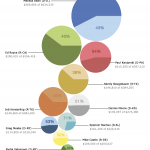Social Issues
In 2007, the American Psychological Association commissioned their Task
Force on Appropriate Therapeutic Responses to Sexual Orientation.
The background is this: early in the history of mental health treatment
efforts, homosexuality was considered to be an illness.
Therefore, it was thought to be appropriate for therapists to try to
change the sexual orientation of persons who are homosexual.
This attitude never was universal; it is said that even Sigmund Freud
was skeptical of it. Even so, it was not until 1962 that efforts
began to remove homosexuality from the…
Just goes to show how lobbying reform hasn't gone anywhere near far
enough:
href="http://www.nakedcapitalism.com/2009/10/guest-post-bank-lobbyists-not-only-trying-to-kill-new-regulations-they-are-trying-to-weaken-existing-regulations.html">Bank
Lobbyists Are Not Only Trying to Kill NEW Legislation, They Are Trying
to Weaken EXISTING Regulations
By George Washington of
href="http://www.washingtonsblog.com/">Washington's Blog.
Everyone knows that the lobbyists for the financial giants are trying
to kill any tough new regulations.
But they are also trying to weaken existing…
The topic of neural enhancement has created controversy. This
came to wide attention in late 2007, upon the publication of various
articles in Nature, as noted by
href="http://scienceblogs.com/retrospectacle/2007/12/cognitive_enhancers_in_academi.php">Shelley
Batts,
href="http://scienceblogs.com/ethicsandscience/2007/12/the_ethics_of_performance_enha.php">Janet
Stemwedel,
href="http://scienceblogs.com/neuronculture/2008/04/steroids_for_the_brain_nature.php">David
href="http://scienceblogs.com/neuronculture/2008/12/survey_the_slippery_slope_of_c.php">Dobbs,
href="…
This is kind of strange: a post about an insurance company, that has
nothing to do with health care.
href="http://www.guideone.com/">Guideone Mutual Insurance
Company recently settled a lawsuit in which religious
discrimination was alleged. This had to do with a "product"
called FaithGuard, which was a kind of homeowners'
insurance.
In 2006, the U.S. Department of Housing and Urban Development began an
investigation, after the GuideOne
href="http://www.ohio.com/news/break_news/11860056.html">failed
to respond to a complaint:
GuideOne routinely asks for religious…
href="http://www.researchblogging.org">
alt="ResearchBlogging.org"
src="http://www.researchblogging.org/public/citation_icons/rb2_large_gray.png"
style="border: 0pt none ;">
A fair amount has been written about the topic of motivated
reasoning. Jonah Lehrer
href="http://scienceblogs.com/cortex/2008/09/motivated_reasoning.php">explains
the relationship between motivated reasoning and the political process;
Orac
href="http://scienceblogs.com/insolence/2009/04/why_projection_isnt_all_its_cracked_up_t.php">addresses
the issue with regard to quantum woo. (Plus more at…
I'm not a regular reader of USA Today, but Maria tweeted this story, and I feel like I need to say something about it or else risk leaving it rattling around in my head like marbles under a hubcap:
About 70% of Americans agree, either somewhat or strongly, that it's beneficial for women to take her husband's last name when they marry, while 29% say it's better for women to keep their own names, finds a study being presented today at the American Sociological Association's annual meeting in San Francisco.
Researchers from Indiana University and the University of Utah asked about 815 people a…
Psychology is turning out to be a rather important field these
days. Nate Hagens has a post on The Oil Drum,
href="http://www.theoildrum.com/node/5519">The Psychological and
Evolutionary Roots of Resource Overconsumption Revisited. He
reviews the evolutionary psychology of poor economic
decision-making. Calculated Risk has a post,
href="http://www.calculatedriskblog.com/2009/06/scientific-american-bubbles-and-busts.html">Scientific
American: Bubbles and Busts. It's based on an article in Scientific
American (
href="http://www.scientificamerican.com/article.cfm?id=the…
It was the second-most-blogged article on the NYT when I got up this
morning; now, it is the first-most-blogged. It is the article
that reports on a survey that shows 72% support for a government-run
health insurance program. The program would be similar to
Medicare, but would be available to persons under 65 and not on Social
Security Disability.
href="http://www.nytimes.com/2009/06/21/health/policy/21poll.html">In
Poll, Wide Support for Government-Run Health
By KEVIN SACK and MARJORIE CONNELLY
Published: June 20, 2009
Americans overwhelmingly support substantial…
When I first heard about the American Medical Association (AMA)
opposing Obama's health care reform, I was troubled. I almost
wrote a post about it, but by the time I got home, I found that others
had beaten me to it.
href="http://scienceblogs.com/effectmeasure/2009/06/revolutionary_medicine.php">Revere,
for example, appears to have written before work,
posting at 6:46AM. That's dedication.
But it the interim, I've come up with a different angle. Part
of it comes from an article on Medpage Today (free registration):
href="http://www.medpagetoday.com/…
Market Folly writes of a new hedge fund strategy, and asks if there are
any more ideas
href="http://seekingalpha.com/article/141982-hedge-funds-latest-idea-investing-in-lawsuits">like
this:
We came across this interesting piece in Dealbook the other
day and thought it was very intriguing. Simply put: hedge funds are now
investing in lawsuits. The premise is pretty simple: they invest in one
side of the lawsuit and get a share of the winnings (if, of course,
they win the case)...
...If you think about it, it makes sense. These investors essentially
'bankroll' a litigation team, thus…
In a post a couple weeks ago, I commented on the ethical dimension of opting out of vaccination against serious contagious diseases:
Of course, parents are accountable to the kids they are raising. They have a duty to do what is best for them, as well as they can determine what that is. They probably also have a duty to put some effort into making a sensible determination of what's best for their kids (which may involve seeking out expert advice, and evaluating who has the expertise to be offering trustworthy advice).
But parents and kids are also part of a community, and arguably they are…
Yesterday, in my first post about the Silence is the Enemy campaign, I wrote:
Addressing rape directly. From the point of view of ethics, you'd think this would be a very short discussion. It is wrong to commit sexual violence. It is wrong to act out your frustration or your sense of entitlement or your need to feel that there is something in your life that is within your control on the body of another human being. It is wrong to treat a woman or a child (or another man) as less than fully human.
Anyone who would argue otherwise could only be a moral monster. Or thoroughly steeped in a…
This month, Sheril Kirshenbaum and Dr. Isis are spearheading a blogospheric initiative to call attention to a continuing epidemic of mass rapes in Liberia even six years after the end of its 14 year civil war, and to try to do something about it.
Last month, Nicholas Kristof described the situation in the New York Times, touching on the particular case of a 7-year-old rape survivor named Jackie:
[S]omehow mass rape survived the end of the war; it has been easier to get men to relinquish their guns than their sense of sexual entitlement. So the security guard at Jackie's school, a man in his…
This is a continuation from
href="http://scienceblogs.com/corpuscallosum/2009/05/peak_oil_imminent_public_healt.php">last
time. Sort of. Last time I wrote about some things from
a recent program at the Johns Hopkins University Bloomberg School of
Public Health, in conjunction with the Centers for Disease Control and
Prevention. I took the material from one of the many
presentations. since then, I have looked thought the slides from
the other presentations. It turns out that the majority of the
material relates more to Peak Oil than to Public Health. …
Barry Ritholtz, author of Bailout Nation: How Greed and Easy Money
Corrupted Wall Street and Shook the World Economy, has a
nice, terse, thought-provoking post on his blog: The Big Picture:
href="http://www.ritholtz.com/blog/2009/05/us-vs-europe-who-is-the-welfare-state/">US
vs Europe: Who is the Welfare State?
By Barry Ritholtz - May 1st, 2009, 10:25AM
Today is May Day, and while International Workers' Day (Labour Day in
the UK), means little in the USA, its a big holiday in Europe. Banks
and markets are closed on the continent, (England celebrates on Monday).
Speaking with Mike…
Dr. Isis has some rollicking good discussions going on at her pad about who might care about blogs, and what role they might play in scientific education, training, and interactions. (Part one, part two.)
On the second of these posts, a comment from Pascale lodged itself in my brain:
I think a lot of impressionable girls, especially in that middle-school age group, get the idea that they can't be good at science or math if they like clothes, makeup, and boys. Is it the science/math sterotype that is the problem, or is it that girls make other choices to pursue these alternate interests? "I…
Well, maybe not Malthus, but Garrett Hardin and Paul Ehrlich -- the
1960's-era neomalthusian academicians -- have been right on the
money. There are hard limits to growth, and those limits are
upon
us. This is the contention of Charles A. S. Hall and John W.
Day,
Jr., two systems ecologists who have published a paper in American
Scientist.
The paper is still behind a pay wall at the publication site, but a PDF
copy can be obtained
href="http://www.esf.edu/efb/hall/2009-05Hall0327.pdf">from
Professor
Hall's web site. (HT:
href="http://www.theoildrum.com/node/5330#more">…
style="display: inline;">
Amy Goodman,
the lead journalist for Democracy
Now!, has been traveling around the country, giving talks, and
promoting her book
href="http://www.democracynow.org/store/product/5/BKSUTMHC">Standing
Up to the Madness: Ordinary Heroes in Extraordinary Times.
This (standing up to the madness) is inherently difficult.
The photo shows her discussing a video of
href="http://scienceblogs.com/corpuscallosum/2008/09/protests_in_minneapolis.php">her
arrest in St. Paul, while covering the Republican convention in
2008.
Ms.
Goodman happens to be one of…
A bunch of people (including Bora) have pointed me to Clay Shirky's take on #amazonfail. While I'm not in agreement with Shirky's analysis that Twitter users mobilized an angry mob on the basis of a false theory (and now that mob is having a hard time backing down), there are some interesting ideas in his post that I think merit consideration. So, let's consider them.
Shirky starts by considering how sentiments were running on the Twittersphere Sunday evening, when Amazon still hadn't put out a statement about what was going on, and how those sentiments didn't ratchet down much by the time…
Those of you on Twitter yesterday probably noticed the explosion of tweets with the hashtag #amazonfail. For those who were otherwise occupied carving up chocolate bunnies or whatnot, the news spread to the blogs, Facebook, and the traditional media outlets. The short version is that on Easter Sunday, a critical mass of people noticed that many, many books that Amazon sells had their Amazon sales rank stripped, and that these books stopped coming up in searches on Amazon that were not searches on the book titles (or, presumably, authors).
What fanned the flames of the frenzy were certain…

